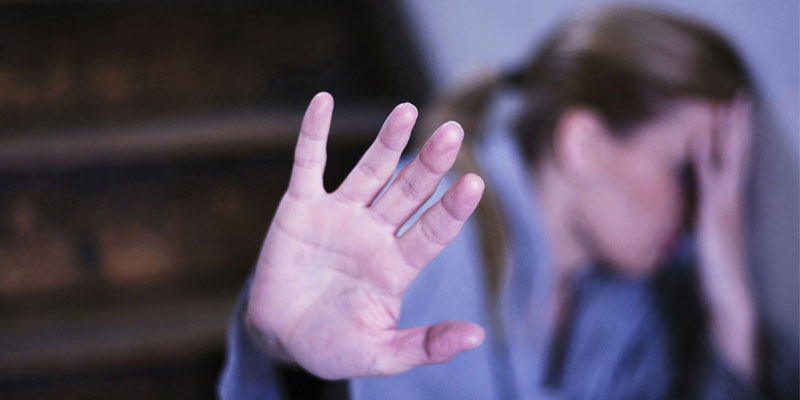When it comes to domestic abuse, 85% of the victims are women. As per the reports, many women are prisoners of domestic violence. Domestic violence could be either in the form of physical, emotional, or financial abuse or a combination of all these three. And before you blame the Indian culture, let us shock you with one more statistic– a woman is beaten every 9 seconds in the United States – one of the most powerful countries of the world. Can you feel the gravity of the situation?
One out of every three women has faced some type of physical violence from their partner. They face physical abuse like slapping, shoving, and pushing. For every seven women, one has suffered injuries inflicted by their intimate partner. [Source]

One of the most common questions people often ask anyone in an abusive relationship is, ‘Why did they not leave the relationship?’ Victims in an abusive relationship hear this question repeatedly as to why they stay in a relationship with nothing to offer them. The hard reality is that sometimes victims do not even know they are in an abusive relationship. And even if they do, they tend to stick to the relationship no matter how violating that may be. Women, primarily victims of domestic abuse, tend to live their entire lives in hopelessness and despair, and we examine why. Before understanding why women stay in such relationships, let us know what it is all about.
What is an Abusive Relationship?
Any normal relationship comprises mutual love, care, concern, respect, understanding, trust, and honesty. However, when a relationship lacks these qualities, and all that are prominent are disrespect, intense jealousy with over possessiveness, domination, and control, it can be said to be abusive. Most of us associate abuse with physical violence because that is the most visible kind. However, it is not the only abuse in a relationship. It ranges from verbal, emotional, mental, physical, psychological, and domestic abuse.
The solution to an abusive relationship might seem very easy to an outside entity, but the reality is entirely different for someone involved. The consequences of staying in an abusive relationship are more than merely a physical injury. Many women tend to submit to abuse because their brains are washed that way- they are made to believe their worthlessness, and so women, already suppressed by society, lose their grip on their lives and thinking. This often makes them confused and depressed, severely compromising their reasoning ability.
What are the reasons for staying in abusive relationships?
Many reasons make women stay in abusive relationships. From fear to low self-esteem and financial dependence, many causes can lead a woman to stick to the abuser without realizing it.
1. Fear
This is probably the most notable aspect of being in an abusive relationship. An abusive partner threatens violence, harms family members and children, and may even give death threats. In such a case, the woman is always wary and fearful for herself and others. She hesitates to take steps to get out of such a relationship. She might also fear what others think or say about her. When the abusive partner is willing to go to any extent to hurt her or her family members, she will naturally back out of taking any steps to help her get out of such a relationship. The abusive partner may have threatened her that he could go to any extent to destroy her or her reputation or could cause harm in any way.
2. Isolation
Being in an abusive relationship can often cause social and familial isolation in women. In such a case, they are prone to becoming reclusive and withdrawn from those around them. They may stop contact with their friends and relatives. When the partner is abusive, he may discourage her from socializing or even being in touch with relatives and friends. This happens because the abuser feels threatened by the people the woman is close to. He blames the victim’s friends and families for all their problems. He may prevent her from going out to meet people. As a result, she will eventually be more isolated and cornered. This makes a woman much more dependent on her abuser.
3. The feeling of low self-esteem
If a woman has been in an abusive relationship for a long time, it can steadily eat away at her self-esteem. Abusers often use guilt as an effective tactic and justify their offensive actions by blaming the victim. A time may come when a woman, the victim, starts doubting her self-worth so much that she starts to think that she deserves the abuse. She forgets to value herself and her selfless actions. She feels that she is worthy of such treatment. The feeling of guilt sets in, and she starts to believe that everything she does or says is always wrong. She becomes psychologically weak and starts undermining herself.
4. They think abuse is normal
Many women in abusive relationships think that this is what is expected. They confuse violence and abuse as some form of expression of love. Women think that every intimate relationship is like this only. They may have seen similar abusive relationships in their family, making them accept the situation. They coerce themselves to believe it is a form of love if their partner is over-possessive. If he is being jealous, it is his way of expressing his love for her. All these notions are entirely wrong. If there is some love, he will try to understand her instead of overpowering or controlling her. He is also afraid of someone else showing her love or affection for the fear that she may leave him.
5. Dependence on the partner
Social isolation can result in over-dependence on the partner despite the abuse. They might also still be in love with the person. The abuser may not be an evil person altogether. In many instances, the abuser will have suffered prolonged abuse and not know how to deal with his emotions. If the abuser shows even some amount of affection, it might lead the woman to think that the abuse will end. In many instances, the abuser himself is confused as to how to treat his woman.
In other instances, he will think that giving her even a tiny change of freedom will make her leave him. When the woman is not in contact with anyone from outside – relatives or friends, she will be utterly dependent on another human being – the abuser. She will even learn to feel solace when she is around him. It is a challenging situation for her to deal with.
6. Financial constraints
An overly controlling and abusive partner will try to manage a woman’s finances. In many cases, they don’t allow them to hold a job, which results in increased financial dependence on the abuser. A woman in a financially abusive relationship will find it much harder to come out, as she doesn’t have the means to survive outside the relationship. The abuser will, in most cases, control her finances for fear that she may use it for someone else or even to get out of the relationship. He wants to hold her in all ways possible. Leaving such an abusive relationship is challenging for women who cannot exercise monetary freedom because of a lack of backup and even personal freedom or financial resources.
In most cases, the abused feels pity for the abuser and doesn’t want to hurt him. No matter how silly the excuses are, the user tries to follow the instructions. The abuser usually comes and apologizes for his actions with words such as “I did not mean it,” or “I was angry,” or “I was just kidding,”, “You made me lose my temper”, etc.
How to get out of an Abusive Relationship?

Though difficult, the victim must start thinking about overcoming abuse instead of brooding or developing depression. Instead of suffering in an abusive relationship, the victim should begin asking themselves “What are the effective ways to stop abuse”? They have to keep connected with their loved ones. Keeping in touch with family or friends will help to overcome the emotional trauma. They can also approach professional experts to know how to respond to abuse. They will also suggest how to handle abuse.
Additionally, attending a domestic violence or abusive relationship-related workshop can be helpful. The immediate mistake one makes is to try new social relations. This may even give opposite results sometimes. Try to confront the partner and do not give another chance to your spouse to abuse again. Be assertive and let him know that they are committing a crime. As the saying goes, ‘an idle mind is the devil’s workshop’; keep yourself engaged by doing other things.
Remember, there is no place for abuse in any relationship. If there is no mutual understanding, love, or trust, remember, investing anything in such a relationship is not good. Abusive relationships are nothing but the silent suffering of women.

3 Comments
Abuse of any kind is never acceptable. It can lead to mental, emotional, and physical health problems such as post-traumatic stress disorder (PTSD), anxiety, depression, suicidal ideation, and chronic pain. In addition, for some people, it can be hard to leave an abusive relationship.
No matter the reason why you stay in an abusive relationship: do not blame yourself.
If you feel like you’re experiencing abuse and need help: call the National Domestic Violence Hotline at 1-800-799-7233 or TTY 1-800-787-3224. You’ll speak with someone who understands what you’re going through and will advise what to do next.
There is never one answer to this type of questions. However, there are many reasons why someone may stay in an abusive relationship. One cannot give an excuse for abuse of any kind, but there are some considerations for why people might stay. You may be staying in the relationship. After all, you have been convinced that you cannot make it without your partner because you love your partner and want to make them happy or because leaving the relationship feels like giving up on yourself. Reasons might vary from person to person, and there is no right or wrong choice in this situation.
Many women stay in abusive relationships. They think it will change, that they can’t make it on their own, or that they don’t deserve better. The cycle goes like this:
– The abuser apologizes and promises to change.
– The victim forgives them and tries to make it work. The abuse repeats, the victim leaves.
– The abuser pursues them again.
This is difficult because there are so many factors at play, including fear of being alone or financial dependence. Women who have been abused often struggle with feelings of guilt and shame, making breaking free even more difficult.
Abuse can take many different forms. It can be physical, emotional, sexual, or financial. Victims of abuse may be too traumatized to leave the abusive situation. They may also feel they have no other options because they’re afraid of losing their jobs, home, and family. Despite the difficulties involved in leaving an abusive relationship, there are many reasons why women stay in these relationships.